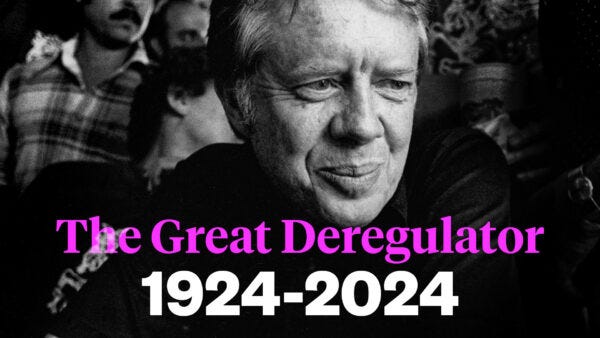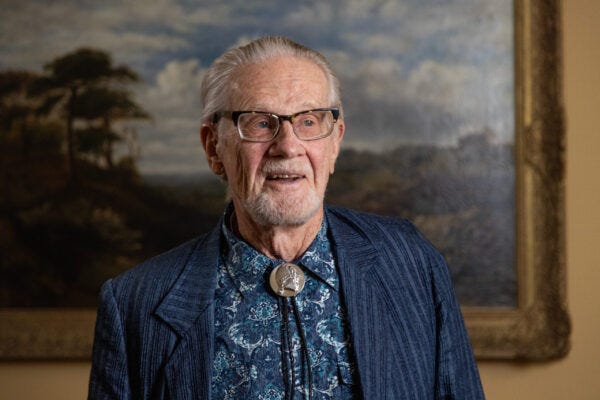RIP Jimmy Carter, 'The Great Deregulator'
Nobel-winning economist Vernon Smith says the 39th president radically improved air travel, freight rail, and trucking in ways that still benefit us immensely.
Jimmy Carter was perhaps the most successful ex-president in American history, winning the Nobel Peace Prize in 2002 for his work promoting human rights and economic and social development.
But his single term as president (1977–1981) is largely remembered as a series of failures and missteps, sometimes literally. Gas lines, a record-high combination of unemployment and inflation on the "misery index," and Americans being held hostage by Iranian revolutionaries for over a year all fueled the perception that Carter was a weak and ineffective leader. When he collapsed during a six-mile run, it personified for many the exhaustion of the country under his leadership. The infamous and politically debilitating ‘killer rabbit’ incident has its own Wikipedia page (read all about it).
But there was at least one way in which Carter excelled as president. He was, in the words of 2002 Nobel–winning economist Vernon Smith, the great deregulator. Carter forced the airline industry, along with interstate trucking and freight rail, to compete for business, with powerful and positive effects that continue to this day.
I talked to Vernon about Carter, whom he met at a White House event for American Nobel Prize winners in November 2002, and what it was like to fly in the days when the government controlled air travel.
Note: This interview with Vernon took place in March 2023. We learned that Carter had just entered hospice care and originally meant to release it in a few weeks, when the former president was likely to have passed. It’s an incredible testament to him that he lived until just a few days ago. Below is the short video with Vernon, followed by the longer interview I did with him almost two years ago.
Here’s the writeup for the full interview with Vernon, which is available as an audio podcast:
My guest today is one of my favorite people in the world. Vernon Smith is the 2002 winner of the Nobel Prize in Economic Sciences for his pioneering work in experimental economics. He's almost certainly the only male Nobel Prize winner who showed up with a ponytail and an Adam Smith bolo tie. More than anybody else, Smith is responsible for taking economics out of the lecture hall and testing its hypotheses by running actual experiments with living, breathing humans.
Born in Kansas in 1927, Smith has lived a life that sounds like a Bob Dylan song. His mother's first husband died in a freak railroad accident, and she used the insurance money to buy a farm that sustained her family during the darkest days of the Great Depression. An engineering whiz, he graduated from the California Institute of Technology in 1949 and then turned to studying economics, first at Kansas University and then Harvard. He's taught all over the country, especially at places far flung from big cities, doing much of his most important work at Purdue University and the University of Arizona. He's currently at Chapman University in Southern California, where he created the Smith Institute for Political Economy and Philosophy, which seeks to "reintegrate the study of the humanities and economics in the spirit of Adam Smith."
I caught up with Smith recently at Reason Weekend, an annual conference sponsored by the nonprofit that publishes this podcast. We talked about the upcoming 300th birthday of Adam Smith and why The Wealth of Nations author remains absolutely essential to understanding the contemporary world—Vernon gives him a special birthday greeting at the start of this show.
We also talked about the people that he namechecked in his Nobel toast—an inspired group that included his co-Nobelist Daniel Kahneman, Friedrich Hayek, and the poet Kahlil Gibran—and his impressions of former President Jimmy Carter, who won the Nobel Peace Prize the same year that Vernon won the economics prize. Smith calls Carter "the great deregulator" and shares a wonderful story about the former president learning late in life how governments and bureaucracies often get in the way of people trying to help one another.
Here it is as a SoundCloud embed:
Happy new year to all! If you like this content, please read Reason! And please share this post or Substack with anyone you think will find it interesting.





This has got to be satire, right?